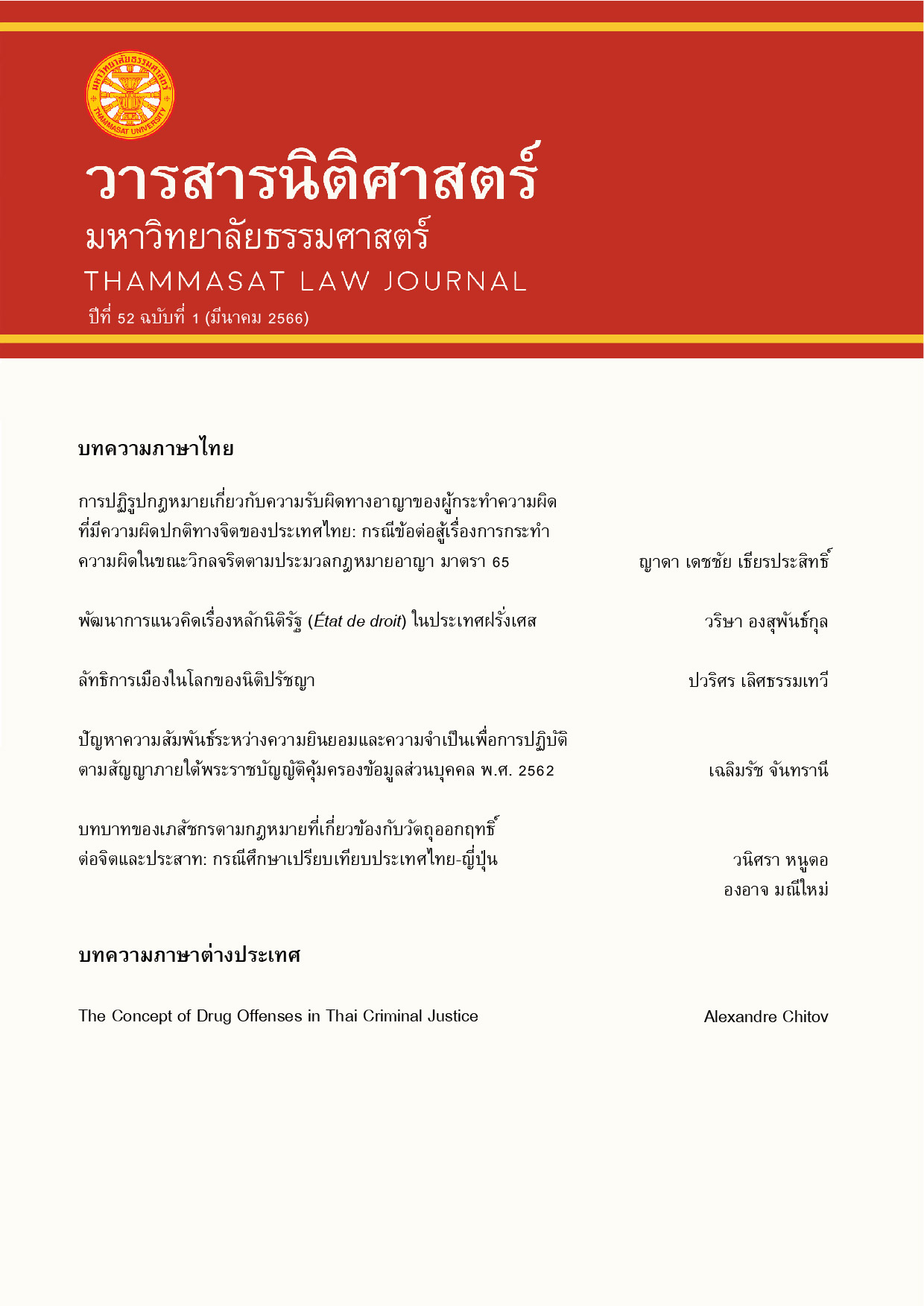The Concept of Drug Offenses in Thai Criminal Justice
คำสำคัญ:
Drug Offenses, Legal Reform, Criminal Law, Confession, Evidenceบทคัดย่อ
The recent developments of Thai law and policy concerning illicit use of drugs is characterized firstly by decriminalization, and secondly by attempting to introduce different rehabilitation programs as alternatives to imprisonment. The concept of Thai criminal law in relation of drug offenses, however, has not changed. This concept is determined by two principles. The first principle is that illegality of possessing a specific kind of drug is determined by an administrative regulation within five categories of narcotics. The second principle of Thai drug offenses law is the distinction between the intent to sell an illegal substance and the intent to possess it for personal use. The new law of drug offenses may not lead to a dramatic drop of cases because of the widespread practice of confessions. However, the new law affirms the principle of the individualization of punishment depending on personal characteristics of offenders. This can help Thai judges to better evaluate the nature of confessions made by the suspects and the accused. One implication of the new Drug Code for criminal justice is that the investigation officials will have to do much more work in gathering evidence than it was under the old law. The new law attempts to introduce a comprehensive system of governmental control over the abuse of narcotic substances that will be extremely difficult to enforce in Thai cultural and social context. The article offers an alternative concept of drug offenses.
เอกสารอ้างอิง
Akbar Patcharavalan and Gloria Lai, ‘Thailand amends drug law to reduce penalties and ensure more proportionate sentencing’ International Drug Policy Consortium (15 February 2017) accessed 15 July 2022, from https://idpc.net/blog/2017/02/thailand-amends-drug-law-to-reduce-penalties-and-ensure-more-proportionate-sentencing.
Alexander Shytov "International Standards of Fairness in Thai Legislation on Criminal Procedure in Juvenile Cases: Statute on Establishing Juvenile and Family Court and the Process of Considering Juvenile and Family Cases, 2010, 2016." ASEAN Journal of Legal Studies Vol. 2, No. 1, pp. 40-53 (2019).
Alexander Shytov and Boonchoo Na Pomphet. Thai juvenile delinquency justice and its perception by minor offenders. Faculty of Law, Chiang Mai University, 2007.
Alexander Shytov, Conscience and Love in Making Judicial Decisions (Dordrecht: Kluwer, 2001), p. 179.
Alexis de Tocqueville. Democracy in America: Historical-Critical Edition of De la démocratie en Amérique, ed. Eduardo Nolla, translated from the French by James T. Schleifer. A Bilingual French-English editions, (Indianapolis: Liberty Fund, 2010). Vol. 1. accessed 15 July 2022, from https://oll.libertyfund.org/titles/2285#Tocqueville_1532-01_EN_1467
Bhagavad Gita (New York: State University, 2009), 11:27-29.
Bible. Gospel according to Mark. 3:5. Greek: πώρωσις τῆς καρδίας. accessed 15 July 2022, from https://biblehub.com/greek/4457.htm.
David Streckfuss, Truth on trial in Thailand: Defamation, treason, and lèse-majesté (London: Routledge, 2010), p. 311.
Gloria Lai, Unchisa (Un) Eaimtong. “Thailand reforms drug laws to reduce impacts of criminal justice system.”
International Drug Policy Consortium (23 December 2021) . https://idpc.net/blog/2021/12/thailand-reforms-drug-laws-to-reduce-impacts-of-criminal-justice-system.
Notifications of the Ministry of Health Re: Specifying the Category V Narcotic Substance 2565 BE (2022 AD)." Royal Thai Government Gazette (8 February 2022) accessed 15 July 2022, from http://www.ratchakitcha.soc.go.th/DATA/PDF/2565/E/035/T_0008.PDF
Samantha Jeffries and Chontit Chuenurah, “Gender and imprisonment in Thailand: Exploring the trends and understanding the drivers” International Journal of Law, Crime and Justice Vol. 45, pp. 75-102 (2016).
Scottish High Court of Justiciary. Khalid v. H.M Advocate. [1984] SLT 137.
Soaring prison population prompts Thailand to re-think 'lost' drug war” Reuters (17 July 2016) accessed 10 July 2020, from https://www.reuters.com/article/us-drugs-thailand-prisons/soaring-prison-population-prompts-thailand-to-re-think-lost-drug-war-idUSKCN0ZX01J.
Statistics report of prisoners in drug cases across the country” Department of Corrections, Ministry of Justice (July 1, 2022) accessed 15 July 2022, from http://www.correct.go.th/rt103pdf/report_index.php?report=drug.
Temple rehab a 'site for torture’” Bangkok Post (23 September 2021) accessed 15 July 2022, from https://www.bangkokpost.com/thailand/general/2186127/temple-rehab-a-site-for-torture
Thai Criminal Procedure Code.
Thai Supreme Court 1029/2548 (2005).
Thai Supreme Court 3119/2550. (2007).
Thai Supreme Court 8148/2551 (2008).
Thai Supreme Court. 2429/2551 (2008).
Thai Supreme Court. 4077/2549 (2006).
Thai Supreme Court. 473/2539 (1996).
Thailand cannabis: From a war on drugs to weed curries” BBC News (21 June 2022) accessed 15 July 2022, from https://www.bbc.com/news/61836019
สรุปสาระสำคัญจากเสวนาวิชาการหัวข้อ ‘ประมวลกฎหมายยาเสพติดใหม่: ประชาชนได้อะไร คดียาเสพติดจะลดลงหรือไม่?’” ศูนย์กฎหมายอาญาและอาชญาวิทยา คณะนิติศาสตร์ มหาวิทยาลัยธรรมศาสตร์ (2 December 2021) accessed 15 July 2022, from https://www.law.tu.ac.th/seminar-summary-new-narcotic-drugs-act/
ดาวน์โหลด
เผยแพร่แล้ว
ฉบับ
ประเภทบทความ
สัญญาอนุญาต
ลิขสิทธิ์ (c) 2023 วารสารนิติศาสตร์ มหาวิทยาลัยธรรมศาสตร์

อนุญาตภายใต้เงื่อนไข Creative Commons Attribution-NonCommercial-NoDerivatives 4.0 International License.
ผลงานที่ตีพิมพ์ในวารสารนิติศาสตร์เป็นลิขสิทธิ์ของวารสารนิติศาสตร์ มหาวิทยาลัยธรรมศาสตร์ และวารสารนิติศาสตร์ มหาวิทยาลัยธรรมศาสตร์ สงวนสิทธิในการเผยแพร่ผลงานที่ตีพิมพ์ในแบบรูปเล่มและทางสื่ออิเล็กทรอนิกส์อื่นใด
บทความหรือข้อความคิดเห็นใด ๆ ที่ปรากฏในวารสารนิติศาสตร์เป็นความรับผิดชอบของผู้เขียนโดยเฉพาะ คณะนิติศาสตร์ มหาวิทยาลัยธรรมศาสตร์ และบรรณาธิการไม่จําเป็นต้องเห็นด้วยหรือร่วมรับผิดชอบใด ๆ



